Innovation and growth report 2019-20
Published 28 September 2020

Parliamentary Under Secretary of State (Minister for Science, Research and Innovation)
Ministerial foreword
Innovation and creativity play central roles in delivering economic and social prosperity. Both drive productivity, grow markets and help create jobs and wealth. They also are at the heart of improving the way we live, making life better. The UK has a long and proud history in this regard, built on a well-developed research base across science, engineering, design and social and cultural research. We also have world-leading creative industries that help to enrich our lives and have a truly global reach.
As the world becomes increasingly competitive and we face a raft of challenges: climate change; new technologies transforming business models; and, in more recent months, the global challenge of Covid-19 -innovation has become more critical than ever.
Despite the challenges, government’s ambition to make the UK the most innovative country in the world remains unchanged. We start from a position of strength, ranked in the top four of the Global Innovation Index 2020 [footnote 1] and top 10 by the World Bank as the best place to start and grow a business. And, as we rebuild from the economic shock of the pandemic, I want to see our support making a real difference for UK firms that are keen to grow or export.
The UK’s Intellectual Property (IP) regime is key, and the Intellectual Property Office (IPO) has responded flexibly to the challenges of Covid-19 with a relaxation of the IP system and the waiving of a range of fees between now and 2021 to help create more breathing space for business. In turn, our IP rich stakeholders have demonstrated impressive collaboration and cooperation in response to the global pandemic. Researchers, companies, partners and even competitors have shared their technologies and knowledge to support efforts to find an effective Covid-19 vaccine.
The government’s ambitious commitment to increase public investment in research and development by 2024/25 underlines our focus and provides opportunities through revitalising our whole system. This report captures not only the work of the IPO and progress towards its aim to become the best IP office in the world but also how it contributes to growing our innovation strengths and maintaining the UK’s global leading position. Ultimately, it shows how our IP system underpins all of the cutting-edge innovation that has become central to all of our lives and how it continues to build a wider economic and cultural environment which encourages and supports this activity.
Research and innovation will be key in releasing the UK’s true potential. Working with the IPO, I will ensure the UK continues to deliver a world class rights granting service, an effective enforcement mechanism, and a strong IP environment to underpin the UK’s Research and Development Roadmap as we face these challenges head on.
Overview
Innovation at the heart of a more prosperous Britain
Innovation and creativity underpin modern lifestyles, businesses and wider society. In today’s constantly changing environment we not only take for granted technologies and services that could not be conceived of just a few years ago but have also come to expect and depend on the constant generation of new ideas and products. Over recent years this has been exemplified by the huge growth in emerging technologies such as Artificial Intelligence (AI). More recently with the Covid-19 pandemic we have seen the importance of finding innovative solutions to the most challenging of problems.
Innovation increases productivity, grows markets and creates jobs. Evidence shows that UK firms that innovate grow at around twice the rate of those that don’t. That is why making the UK the very best place in the world to be an innovator is central to the Government’s vision for recovering swiftly from the Covid-19 pandemic and developing a more prosperous Britain; one that is greener, safer and healthier than before.
The UK starts from a position of strength ranked 4th in the World Intellectual Property Office’s Global Innovation Index 2020 [footnote 2] and in the top 10 best countries to start and grow a business. But with the global landscape changing and the UK faced with challenges never seen before the government is committed to revitalising research and innovation. The recently published Research and Development (R&D) Roadmap [footnote 3], along with the UK’s Industrial Strategy [footnote 4], sets out how this will be achieved and the Government’s unprecedented commitment to drive forward the largest investment in R&D in four decades to £22 billion per year by 2024/25.
In today’s constantly changing environment we not only take for granted technologies and services that could not be conceived of just a few years ago but have also come to expect and depend on the constant generation of new ideas and products.
The role of Intellectual Property
Intellectual Property (IP) is crucial to incentivising innovation. Innovation involves: taking a risk; investing money in new research & development; investing time in writing a book or a song; or using savings to launch a new brand. IP can reduce the risk by allowing innovators to protect their creations through the interconnected system of rights; trade marks, patents, copyright or designs. Protected by IP rights, inventors, researchers and creators can pour their time, money and knowledge into developing new and better things with the confidence that if successful, they can benefit from the result and make a return on their investment. By creating a temporary monopoly in which innovators are sufficiently rewarded, IP creates an incentive for R&D, leading to innovation.
Of course, innovation happens when knowledge is shared as well as when it is protected. IP rights are in the public domain, promoting the diffusion of ideas and the sharing of knowledge.
Investment in IP makes a significant contribution to innovation and productivity for the UK economy:
- in 2016, firms in the UK market sector invested an estimated £134.3bn in knowledge assets, of which £63.8bn was protected by IP rights. This equates to 6.8% and 3.2% of total GDP, respectively [footnote 5].
- the UKIPO estimates that industries with an above average use in IP rights accounted for 26.9% of UK non-financial value-added output, 15.5% of total UK employment and 52.1% of goods exported [footnote 6].
- in 2018, the UK exported £16.3bn and imported £10.2bn of IP services, resulting in a trade surplus of £6.1bn [footnote 7].
The work of the Intellectual Property Office
The IPO is the government body responsible for administering and granting IP rights in the UK and developing the necessary legislative and policy frameworks. Our ambition is to be the best IP office, helping the UK to become the most innovative and creative country in the world. To achieve this, we have two external-facing aims – to Deliver Excellent IP Services and to Create a World-Leading IP Environment, along with a people-based objective of Making the IPO a Brilliant Place to Work.
Delivering excellent IP services for our customers is central to the IPO. To be the best, we will build on our strengths in rights granting and related services, provide timely, reliable and quality services, develop end to end digital services and improve our data services.
We also want to create a world-leading IP environment. The UK has a world class IP system, but this is only part of the picture. We want the whole IP environment, from the legal and policy framework, to the level of IP knowledge and the ability to protect rights to be world leading and provide incentives to be creative and innovative. We will achieve this through developing the legislative and policy framework; increasing IP’s impact through awareness and education; and reducing IP crime and infringement.
To deliver the best service, we need happy and well-motivated people with the right skills, tools, values and behaviours, and working environment. The third strand of our strategy is therefore to make the IPO a brilliant place to work. This will create the conditions to allow our people to flourish and deliver the two key customer-focused objectives set out above.
This report outlines many of the things we are doing to support innovation and growth in delivering our two customer-facing objectives - Delivering Excellent IP Services; and Creating a World-leading IP Environment.
Delivering excellent IP services
Delivering excellent IP services for our customers is central to the IPO. The rights granting service we provide for patents, trade marks and designs provide certainty for innovators. By administrating IP rights in a timely and reliable way we provide the confidence that their investment is protected, encouraging the development of innovations, creating jobs and economic growth.
Our Customers
Our customers are at the heart of everything we do. We already deliver excellent customer service with our customers rating our services highly; this year we met a challenging benchmark of over 85% (85.6%) of our customers scoring us 8 out of 10 on satisfaction. We have achieved this whilst tackling challenges such as increasing demand and ageing IT systems.
We recognise that there is more that we can do and we are committed to becoming a truly customer-centric organisation, ensuring the services we provide support innovation and creativity. A key focus of this year was to develop a Customer Strategy, setting out a vision of how we will achieve this. Our Customer Strategy provides the framework for our dealings with customers, setting clear expectations and emphasising that customers are a priority for everyone at the IPO.
During the year we also implemented a new approach to measuring customer satisfaction, gathering significantly more information about a wider range of customers. This has helped us better understand our customers, their needs and what they value. The findings have been central to our work to drive improvements in business areas and highlight areas for IT change and longer-term transformation. In particular, the move to more frequent measurement of customer satisfaction has meant we have been able to make focused improvements throughout the year.
Delivering core services
The relationship between IP rights and innovation is complex. Many of the ideas contained in applications for IP rights may not be commercially successful and there is often an indirect impact of IP rights to innovation. IP rights, in particular patents, provide inspiration to follow-on creations, or what is known as incremental innovation. This means the volume of rights applied for is not a direct indicator of innovation or economic growth. Nevertheless, processing applications in a timely way enables businesses to both protect their IP and have clarity on what rights others have, improving their ability to innovate and grow and for the country to prosper.
In 2019/20 we saw another record year in terms of trade mark demand. Overall, we received our highest ever input of 106,916 applications, up 6.4% on the previous year. Of these, 89,887 applications were received via the national (IPO) route, 3.1% higher than 2018/19. The customer service standard in this area is to issue the first report within 10 working days of filing, we have achieved this in over 99% of cases.
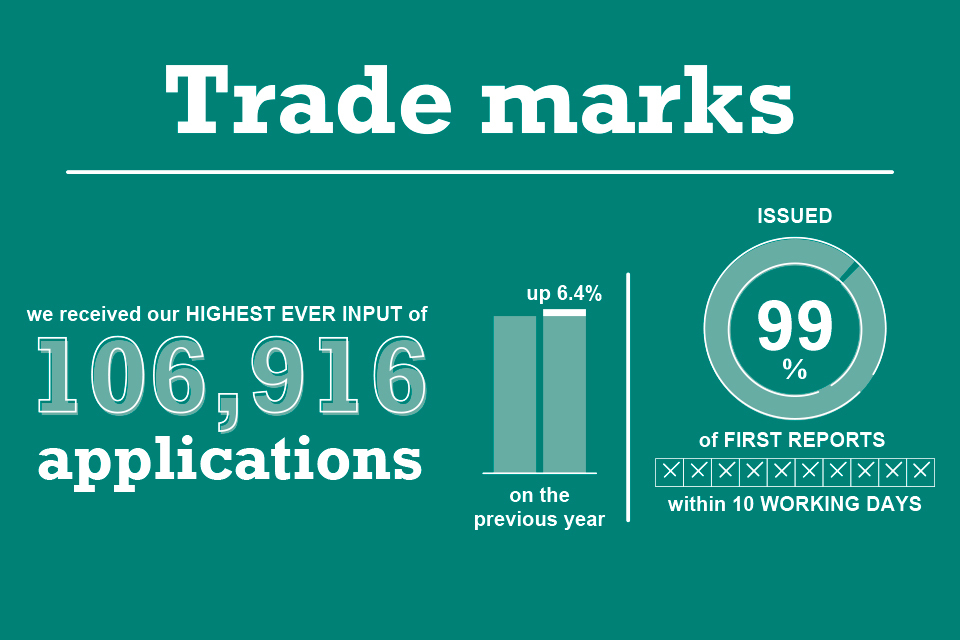
Trade marks statistics
Designs have also seen a record year, an overall increase of 9.9% for designs with 28,185 applications. The growth came from applications via the international route. We achieved our target to issue the first report within 10 days in 96% of cases.
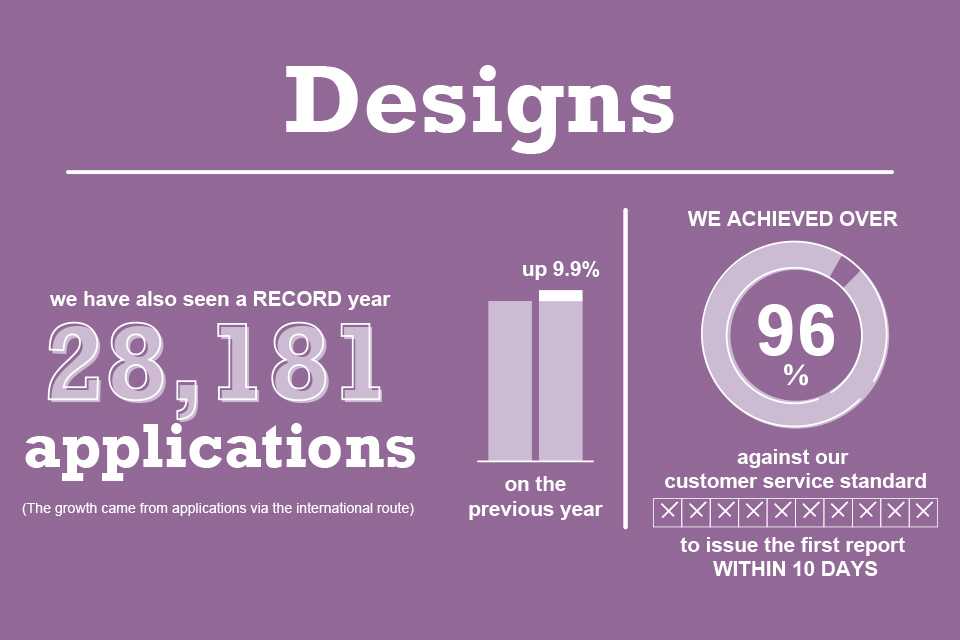
Designs statistics
In patents, we met 95% of requests for accelerated processing of patents within two months and continued to reduce our examination backlog by 24%.
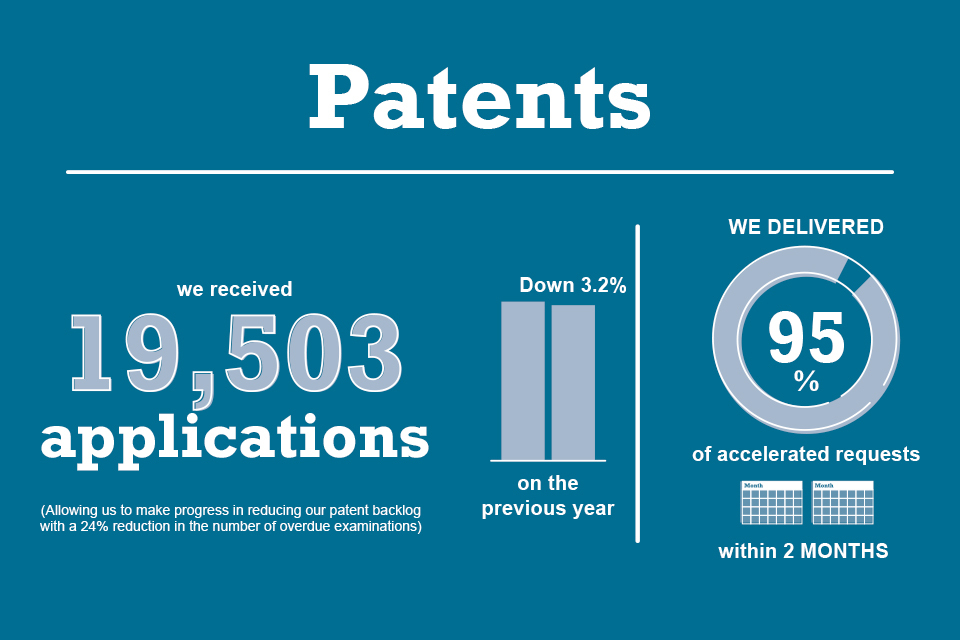
Patents statistics
Digital transformation
Whilst we consistently achieve extremely high customer satisfaction scores, our customers regularly tell us they would like to be able to access our services digitally more effectively. Our goal is to provide customers with services that are consistent across all our rights, making it easier for them to interact with us in applying for and managing their IP rights. Our Transformation programme will revolutionise the way we provide services to our customers so that they can spend less time using our service gaining maximum benefit from their creativity.
Over the past year we have embarked on a mobilisation phase during which we will make sure all the elements are in place to enable us to complete this complex, multi-year programme successfully. We have developed a high-level Roadmap outlining our journey and the principles we will follow throughout including keeping our customers at the heart of everything we do. We have implemented new governance structures, are building the capability we need across the IPO and work has begun on developing a comprehensive business change and communications strategy to ensure our staff and customers understand and are fully involved in this transformation.
Our flagship enterprise-wide Renewals service epitomises the world-class services we strive to provide. Customers can now renew up to 1,500 patents, trade marks and designs in a single transaction and receive immediate confirmation, digital renewal certificates and much faster updating of the register in a user journey that has reduced transaction time from 5 days to 5 minutes and slashed the amount of paper correspondence we issue. The service has been enthusiastically embraced by customers and the Ministerial target for 2019/20 was met with 93% of all renewals carried out via the new service by March 2020. This is also important in our goal to decommission our legacy systems as it has removed 80-90% of all revenue transactions from our legacy finance system POCAS, significantly reducing the operational risk associated with that system.
We have made excellent progress in our work to harness the potential of AI to offer new services for our customers. At the end of March we launched a pilot Pre-Apply Trade Mark tool which includes the new AI-powered trade mark search platform. This will help would-be applicants make informed choices about what they apply for avoiding unnecessary cost to businesses whilst the Examiner-Assist service (also containing the same search tool) was used by a small group of trade mark examiners. IPO is committed to iterating and enhancing these tools next year so that their full benefits can be realised.
Providing certainty to our stakeholders on EU IP rights
The current UK IP system combines elements of national, retained EU and international law. The UK is also party to a number of international treaties and agreements which protect and enforce IP rights.
To ensure we deliver the best possible outcomes on IP and that our stakeholders have the certainty they need, we have successfully delivered the policy and legal framework to support the end of the transition period with the EU on 31 December 2020. For example, we have identified international treaties and agreements that we are signed up to as members of the EU and we have legislated to ensure their continuity.
In case there is no UK-EU Free Trade Agreement in place by the end of the transition period, we will have passed nine statutory instruments. These pieces of legislation will ensure continuation of rights (where appropriate) and a functioning statute book at the end of the transition period, and they will minimise disruption to businesses and right holders.
As EU trade marks and registered community designs will no longer provide protection in the UK at the end of the transition period, the legislation included the legal creation of new, equivalent UK trade marks and UK registered designs. We have done the same for international IP rights that designate the EU. This will guarantee that owners of these IP rights do not lose protection for their valuable property. To support this, we have been updating our IT systems to make sure that the extra two million rights (approximately) created by the legislation will be visible and accessible at the end of the transition period.
We have also launched various communication tools and participated in business outreach activities to keep stakeholders informed on how the end of the transition period might affect them. This includes a short series of videos and participation in regional roadshows, so that our stakeholders and customers are able to make well informed decisions around IP.
Creating a world- leading IP environment
IP’s impact on innovation and growth depends on more than our rights granting system. The legislative and policy framework needs to support innovation, people need to know what IP rights can do for their business and how to access them, and IP rights need to be enforced or they are worthless. Over the past year we have worked hard to improve the overall IP environment and ensure that it supports the Government’s ambition of making the UK the most innovative country in the world.
Encouraging innovation through policy development
Our aim is to produce the optimal IP framework for the UK, one that promotes innovation and creativity both now and in the future.
Supporting the UK’s independent and political future
Our teams have been integral in free trade negotiations with the EU and other bilateral partners, ensuring that the importance of IP is reflected. Work has also taken place on our preparedness for independent World Trade Organization (WTO) membership and representation at the Trade-Related Aspects of Intellectual Property Rights (TRIPS) Council.
We recognise the importance of maintaining strong relationships with key global partners both bilaterally and through the multilateral institutions, in order that we continue to be able to positively influence IP policy internationally. Our aim is to create a world leading IP environment and ensure a balanced and fit for purpose international IP framework that maximises the benefits of innovation and creativity. At the end of the transition period with the EU, we want to harness the opportunities that will become open to us both through trade deals and more broadly.
Understanding the impact of Artificial Intelligence on the IP framework
The Government is committed to advancing the UK’s AI sector. AI is one of the four Grand Challenges forming the UK’s Industrial Strategy [footnote 8] which aims to boost the productivity and earning power of people across the UK, and to increase the level of investment in R&D from 1.7% to 2.4% of GDP by 2027.
It is important that the UK IP framework continues to support innovation for the benefit of all. To that end, and to put the UK at the forefront of the AI and data revolution, we have developed an AI Strategy to ensure that the UK’s IP framework incentivises the development and adoption of AI technologies by;
- building business and consumer confidence in how the IP framework treats AI;
- growing IP skills among AI developers and researchers, to ensure the necessary awareness is embedded at the outset; and
- playing a lead role in international efforts to understand and address the questions AI poses for the IP framework
The IPO is committed to exploring the commercial, economic, legal and social implications of AI as it relates to the IP framework. We have increased our understanding of the opportunities that future technology can have on our framework through leading discussions with other IP offices across the world. In June 2019, the IPO, in partnership with WIPO, hosted an international conference on AI and IP at the iconic London Stadium. Since then the UK has played a leading role in this area. We are engaging the new WIPO leadership in a similar fashion and we have established a cross-regional group of countries ready, willing and able to move ahead with the international debate on AI and IP.
To further increase our understanding of how the IP framework can incentivise the development and adoption of AI technologies we issued a call for views [footnote 9] in September 2020. The resulting government response will provide the clarity our customers need to invest in AI in the UK with confidence.
IPO Futures Group
The Futures Group’s purpose is to increase the IPO’s understanding of the potential opportunities and challenges posed by new technologies now and in the longer term. Over the past 18 months the focus of the Futures Group has been on IP and AI.
To produce a more structured and prioritised roadmap for the future the Futures Group plans to undertake an IPO-wide ‘Three Horizons Mapping’ scanning exercise [footnote 10]. It will not be restricted to thinking about the impact of future technology on the IP framework, but will also consider the impact of future socio-economic shifts such as migration and diversity, an ageing population, new trade dynamics and global environmental resource pressures. Further ‘Three Horizons mapping’ workshops are planned for Spring 2021 with external stakeholders to allow us to capture the independent perspective.
This work will help develop our priorities and enable the IPO to develop a structured programme of work to ensure that it continues to be abreast of and lead the way on maximising the opportunities that future technology could hold for investment in IP in the future.
Inventor Gender Report Case Study –
Addressing the gender data gap
The government is committed to making the UK the very best place in the world to be a researcher, inventor or innovator and want to enable people of all backgrounds and experiences to engage and contribute to research and innovation. The representation of women within STEM fields (science, technology, engineering and mathematics) is of particularly great importance to governments and policymakers.
Outputs of work undertaken within STEM industries include inventions for which patent protection is sought. Consequently, a recurring question that has been asked of the IPO over the past few years relates to patent statistics about female inventors. Inventor gender is not disclosed during the patent application process, so the IPO has undertaken extensive experimental research into the representation of women in worldwide patenting. Our work infers gender based on the inventor names which do have to be disclosed as part of the patent application process.
In 2016 we first published this ground-breaking and award-winning research analysing inventor gender. Our original research was world-leading in terms of inferring inventor gender globally using a worldwide patent database of 85m patent applications comprising over 35m inventors. We were delighted to receive the Research Award at the Global Equality and Diversity Awards in 2017 for this work bridging the gender gap in IP. In October 2019 we published an updated research paper [footnote 11] with all the latest data as we continue to track the ever-increasing contribution of female inventors in worldwide patenting.
Women account for an ever-increasing proportion of patent inventors; historically, 2-3% of inventors worldwide were female, but this has risen since 1960 to reach 6.8% in 1998 and has almost doubled in the past 20 years to reach 12.7% in 2017. These statistics are inherently impacted by legacy workplace demographics, but positive progress is being made and women are now contributing to a much larger proportion of inventors with over one in five patent applications now having at least one female inventor. The technology areas that enjoy the greatest levels of female participation are Biotechnology, Pharmaceuticals and Organic Chemistry, with women contributing to the inventions of approximately half of the patent applications made in these fields in recent years. Our research focuses on trends over the past 20 years and provides a breakdown of female inventorship by country and by technology area. The role of female inventors, working individually or as part of a team of inventors, is also analysed.
Key Findings
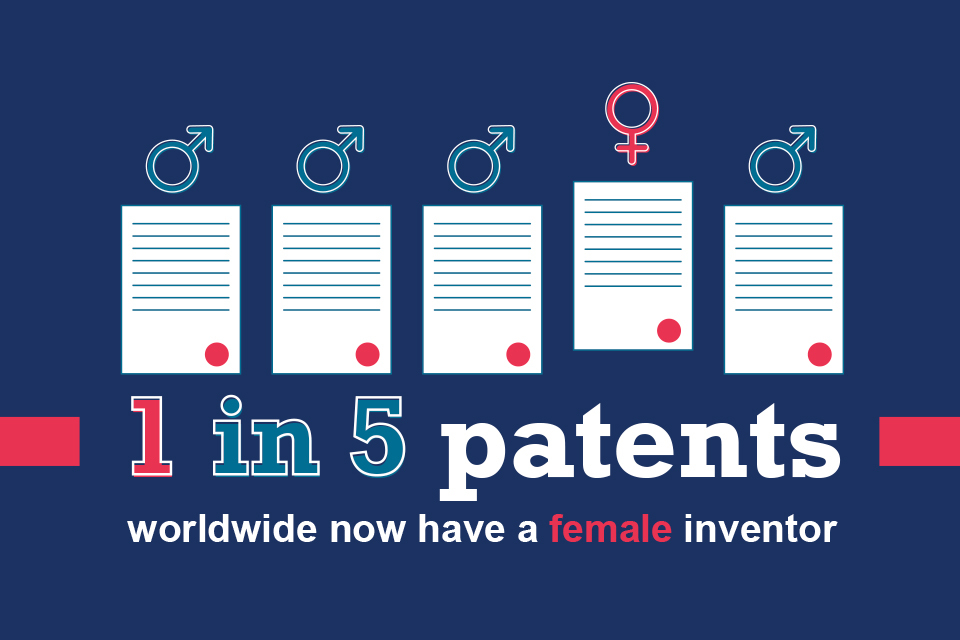
Key findings: 1 in 5 patents worldwide now have a female inventor
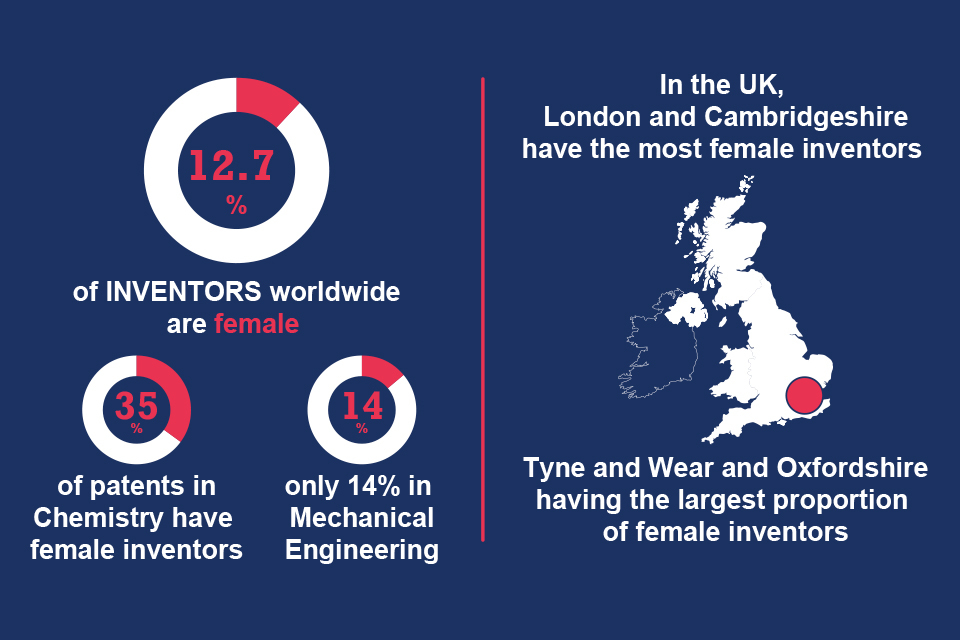
Key findings: statistics of females inventors and their specialism
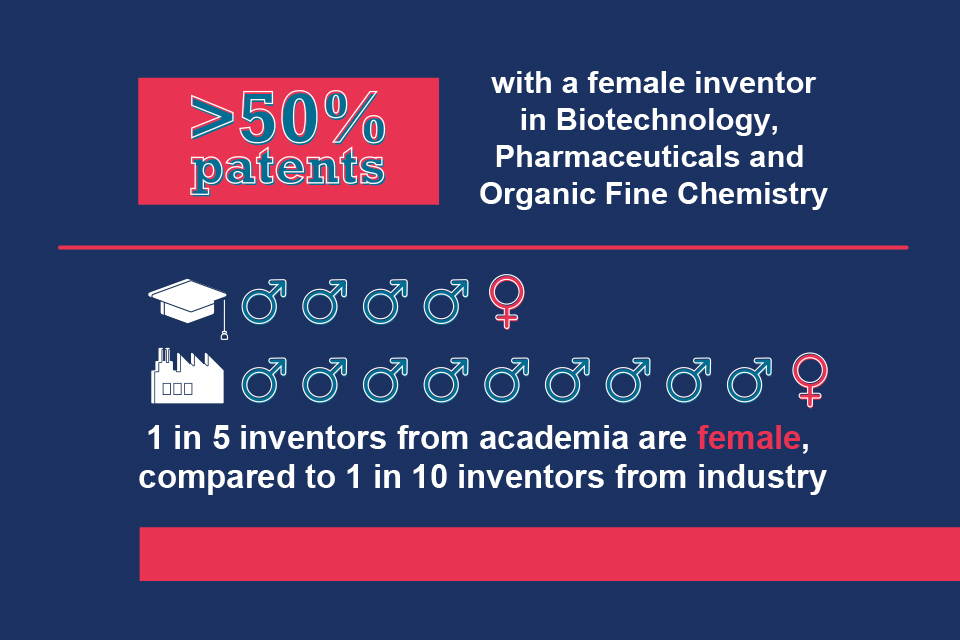
Key findings: 1 in 5 inventors from academia are female compared to 1 in 10 inventors from industry
The IPO’s international activity
All of our international work is targeted towards a common goal: ensuring the international IP environment maximises the benefits of innovation and creativity for the UK economy and society. With our network of IP attachés, provision of IP expertise to the independent trade agenda and global influence, we are well-placed to achieve that ambition.
Over the past year, we have worked with our international partners to build enforcement capability, influence progressive policy changes and improve the role of IP in supporting innovation. All of which have an important role to play in providing the best opportunities for UK organisations to trade, invest and innovate successfully overseas. We are also committed to ensuring that businesses have the tools they need to navigate the international IP environment. This year we reached over 5,000 businesses looking to manage their IP overseas but there is more we can do. Looking ahead, we are considering how we can best support growing UK export interests in Africa and the Middle East and how we can improve our overall business support offer, whether that be online or through our teams of experts.
Brazil
We have made a very positive impact on the enforcement landscape in Brazil. As a direct result of our engagement, there has been increased support for the creative sector including the take-down of 86 infringing music domains, totalling over 328 million yearly visits which caused an estimated damage of £42 million [footnote 12] to rights holders, many of whom are from the UK. Following on from this we have also been working with the State of Sao Paulo to establish an IP crime unit similar to that of the City of London Police’s “ Police Intellectual Property Crime Unit PIPCU”.
The UK Government has also been working with the Brazilian IP office to fund a multi-million pound project that will make real impact on the backlogs to granting IP rights in Brazil - a key factor in why many UK businesses are reluctant to invest in the region. These actions show real willingness from Brazil to address IP challenges and support innovators, producers and content creators.
India
The UK continues to be a partner of choice on IP and innovation in India, including through our new IP attaché. For example, the IPO made a valuable contribution to the Confederation of Indian Industry conference on IP. The UK delegation promoted UK best practice on valuation and commercialisation of IP as well as effective IP enforcement.
Such collaboration is an important contribution to the wider UK-India relationship on trade, innovation and investment; leading to an important agreement; at the 2020 Joint Economic Trade Conference (JETCO) to strengthen the positive impact of IP on innovation and creativity.
Middle East
In 2019-20 we increased our engagement with the British Embassy network in Saudi Arabia and United Arab Emirates (UAE) on scoping the regional IP environment, to inform a potential extended offer of support for UK businesses trading in the Gulf States. This has led to exploring virtual opportunities to continue this positive action, including collaboration with the Saudi Arabian IP office (SAIP) and working with HMRC on enforcement in UAE.
China
In Shanghai and Beijing, the eighth annual UK-China judicial exchange on IP strengthened the UK’s positive influence on the progress of the Chinese IP legal system, specifically on priority topics for reform including bad-faith trade mark applications, Standard Essential Patents, interim injunctions and website blocking.
In October 2019, the IPO lead a delegation to Beijing for the sixth Heads of Office visit to China. The visit advanced the strong collaboration with all major IP agencies, including the IP valuation, finance and commercialisation. During the visit, the IPO co-hosted the fifth UK-China IP symposium, focussing on new developments in trade mark policy and legislation in China, IP enforcement and the implications of future technologies for the IP framework.
United States
This year we have recruited our first North American IP attaché, based in Washington DC, and have been providing in-country expertise and US trade knowledge to the UK negotiating teams on IP and supporting preparations for the ongoing discussions. This workstream increases future opportunities for UK innovators to maximise the potential of the US market.
World Intellectual Property Organisation
Throughout 2019-20, the IPO played an influential role at the World Intellectual Property Organisation (WIPO) to secure the delivery of a high-quality international IP system for UK innovators and creators whilst reinforcing the UK’s commitment to multilateral progress on IP.
In support of the UK Industrial Strategy’s emerging technology ambitions, we continued to promote UK leadership on the positive interactions between IP, AI and the innovation of emerging technologies.
Going forward the UK will chair our regional group of countries at the WIPO for the first time, demonstrating the UK’s leading international contribution post-EU Exit and delivering outcomes that support UK innovation and growth.
ASEAN (Association of Southeast Asian Nations)
The Southeast Asia attaché team continues to work with the ASEAN IP working group to enhancing the UK’s reputation as a world leader on IP’s role in innovation and growth. Highlights this year include a successful project to collate and share enforcement practices across the 10 ASEAN members.
In August, the IPO presented at Singapore’s annual IP week event as part of a programme of engagement that showcased the UK’s work and how we are addressing the ‘big questions’ such as AI. The visit also included an opportunity engage industry stakeholders on “IP in the ASEAN century” as well as a live TV interview on Channel News Asia on the importance and wide-reaching nature of IP.
Increasing IP’s impact through awareness and education
Having excellent IP services and a world leading IP framework does not produce any benefits if people do not understand how to access and use them. Our aim is that IP management is an integral part of any business planning with businesses and entrepreneurs taking informed decisions about using IP both in the UK and as an asset abroad. We also believe that everyone should have an understanding of IP. We want young people to leave education knowing about IP and exciting career opportunities in IP, researchers and universities to understand how to use IP to secure the greatest benefits from their research and our colleagues in government to recognise the economic and social benefits of IP in their policy making.
Our work with businesses
We know that IP adds value to a business’ bottom line. Many businesses do not know that they have IP let alone how best to protect and use it to grow. Working on our own and with intermediaries, we support innovation and growth by increasing the awareness around IP. This year we reached over 70,000 businesses with information about IP, 84% of which reported making an informed decision about managing their IP as a result of this interaction. We have set out below some of our key activities this year to encourage and increase IP awareness amongst businesses. We are currently facing challenges with the way that we can engage as a consequence of the Covid-19 pandemic but this has allowed us to be more innovative.
Business 2 Business (B2B) toolkit
To help businesses facilitate IP terms within collaborative agreements, the IPO created and launched the B2B toolkit in 2019. This online resource aims to equip UK businesses with the skills they need to successfully collaborate whilst taking control of how IP is managed and commercialised.
IP for investment toolkit
In 2019, the IPO redesigned the IP Finance toolkit, creating and introducing the IP for Investment toolkit. The new, online toolkit is aimed at supporting IP-rich businesses in seeking equity growth funding. Due to the impact of Covid-19, we are planning to formally launch this toolkit later in 2020 through webinars.
IP audits
This year we approved and part-funded 260 IP audits for high growth and potential high growth businesses which were delivered through our partners Enterprise Europe Network in England, and Scottish Enterprise and the Welsh Government in their respective devolved areas. An IP Audit provides a complete overview of a business’s IP assets, assesses the effectiveness of the approach taken to manage this IP, and makes recommendations for any improvements.
We survey audit recipients six months after the close of the scheme to assess the impact on their activity. Evaluation carried out in October 2019, confirmed that the audits are continuing to have a positive impact by providing businesses with the knowledge to identify their IP assets, making them a priority for their business and understanding the value of their assets. 91% of businesses reported that the audit had had a positive impact on their business, with 71% reporting that they had changed or introduced an IP management strategy as a result. The research also shows that the follow up support businesses receive from their coaches and appointed IP professionals remains integral to the success of the audit.
The evaluation also highlighted that businesses are aware of the risks/limitations to their IP and understand how to manage them. Not just potential infringement but also internal IP management strategies.
The integrate review scheme
The IPO has been running a pilot delivered by business advisers from a variety of partner organisations including Growth Hubs, the Business and IP Centre Network, Enterprise Europe Network and a University. The purpose of the ‘Integrate Review’ scheme is to test a structured and standardised approach to integrated business and IP planning and management with start-ups (those who have already begun trading), primarily in the tech and creative sectors.
They have delivered 25 reviews so far with feedback from partners and businesses being extremely positive. Advisers report that it effectively fills a gap for those businesses that sit between pre-start and scaling in the lifecycle and helps them to establish crucial best practice with their clients around their IP assets and their management.
Recipients of the reviews have expressed a high level of satisfaction with the process, would recommend it to other businesses and have in some cases already taken action to secure IP rights. The pilot will finish in September 2020 after which the IPO will analyse the data and decide if and how the model may be rolled out to wider partners.
IPO regional work
During this year we have continued to build IP capability and influence policy thinking on a regional basis through our three regional policy advisors. Within Birmingham, Greater Manchester and Oxfordshire they have worked with Local Enterprise Partnerships to build understanding and ensure that IP is included as part of business planning and to support the development of Local Industrial Strategies.
Working in partnership
The IPO has been a long-standing partner to the Business & Intellectual Property Centre (BIPC) network, working alongside the British Library, offering IP information and guidance to businesses and individuals locally.
As one of the original partners, the IPO has supported the ongoing development and growth of the network. This includes training and developing advisors via its IP Masterclass, IP workshops and online tools and resources and building connections to other business support providers in their region.
In the last year the BIPC network has expanded, with Worcester and Brighton and Hove libraries becoming pilot centre. We are now working with Oxford and Kent Libraries as the next pilot members joining the network.
The partnership with the British Library and BIPC network has ensured that businesses and entrepreneurs are able to access combined business and IP support at the right time in their development, enabling IP assets to be considered as part of business planning.
During this year we have continued to build IP capability and influence policy thinking on a regional basis through our three regional policy advisors.
Working with young people and universities
IP in the classroom – engaging young inventors
It is important that we realise long term understanding of IP and its role in creation and realisation of ideas. By engaging with primary education, we want young people to realise the importance of IP on what they create and use in everyday life.
We relaunched the Wallace & Gromit’s Cracking Ideas resource and competition with Aardman for young people aged 4-11. The competition asked young people to ‘make life better’ by taking existing technology and improving on it for the benefit of their friends, family or wider community. The competition generated 1492 entries from across the UK with 97% identifying the IP in their designs and inventions. The winning invention ‘Litteration’ by Dominic Marday will feature in the new Wallace & Gromit story ‘The Big Fix Up’, the UKRI funded audience of the future challenge.

Wallace & Gromits Cracking Ideas Competition
Knowledge exchange and IP education
We have developed a new IP and Knowledge Exchange Strategy to set out how we will support Higher Education Institutions – universities and research institutions – to use their IP to achieve the greatest economic and social impact. We have reviewed our policy on IP Education and set out our strategic priorities to ensure that all young people develop an understanding of IP and a respect for others’ rights. These strategies are shaping our work with the education and research sector to support the UK’s ambition to be the most innovative country in the world.
IP for Research
To help PhD students and early career researchers understand how IP fits into their research and the commercialisation process, the IPO created the IP for Research programme, a set of online resources, ½ day workshop and webinars and live lectures. During the academic year 2019/20 we partnered with Vitae, the professional body developing researchers in the UK – we delivered together 17 events, including workshops, webinars and a live lecture to 566 researchers. In response to Covid-19, we also delivered two more live lectures to 317 researchers tailored to both STEM and arts, humanities and social sciences specialisms. Post event feedback showed that researchers understanding of IPRs and how to apply them to their research increased to over 95%. 91% of researchers also said they would recommend the events to others.
Working in partnership
The IPO worked closely with Vitae – the professional body developing researchers within the UK – to develop and launch a new Intellectual Property Lens as part of the Vitae Researcher Development Framework (RDF). This lens highlights the importance of understanding IP in the professional development of researchers. The lens provides an overview of the key knowledge, behaviours and attributes that researchers need to develop to ensure they understand IP and how they can use it to maximise the social and economic impact of their research.
Working with government
At Budget 2018 the UK government published a report ‘Getting smart about IP and other intangibles in the public sector’ looking at the value of public sector intangible assets and considering how they are managed.
Independent estimates place the value of the UK’s knowledge assets at £150bn, but UK government accounts records only £35bn, highlighting different approaches to recording intangible assets on the balance sheet.
The report made ten recommendations for how the government can improve its recognition and management of these valuable assets, which have been grouped into several workstreams:
- guidance, recognition, protection and valuation;
- incentives and investment;
- central support, networks and reporting; and
- data
The report found that there was asymmetric understanding and awareness of the importance of IP across UK government. Over the past year we have worked closely with HM Treasury (HMT), and a report on findings and next steps is due to be launched later in 2020. In support of this the IPO will lead on IP training and awareness activities across the public sector and on IP data and analysis.
Encouraging innovation through enforcement
IP rights have limited value in themselves if they cannot be appropriately enforced. The IPO works across a range of areas to support the effective enforcement of IP rights, and we believe this provides part of the necessary foundation which allows innovation to flourish.
Furthermore, infringement of IP rights impacts on jobs and economic growth. Imports of counterfeit goods accounted for as much as £13.6bn in 2016, around 3% of UK imports. This is estimated to have amounted to £9.2bn in lost sales, threatening jobs and cheating the public purse [footnote 13]. On top of this counterfeit and pirated goods can be low quality and often dangerous, putting consumers at risk.
We are looked at as thought leaders in IP enforcement and our ambition is to create a shift in attitudes towards infringement, working towards a time where IP infringement is seen as socially unacceptable by all.
Enforcement framework
During the year we progressed work on our review of the enforcement framework, which seeks to understand if our legal framework is effective, consistent and proportionate across all IP rights and facilitates easy access to justice for all types of businesses and entrepreneurs. To support this work, we held a successful public recruitment campaign in July for volunteers to join the Enforcement Framework Review working group. This group identified three key issues:
- costs of legal challenges;
- accessibility and effectiveness of judicial processes; and
- online infringement.
With the assistance of the group, we have been able to finalise an initial Call for Views document, which will enable us to understand stakeholder opinion across various interested sectors. Unfortunately, publication of the Call for Views was delayed due to the Covid-19 crisis and this key piece of work has been carried forward into 2020/21.
Providing strategic leadership and investing in enforcement intelligence
We have continued to provide strategic leadership in the enforcement space and invest in enforcement intelligence both in the UK and internationally. Some examples of what we have achieved throughout the year include:
- the IPO Intelligence Hub was involved in the seizure or restraint of over £2.26m in proceeds for IP crime. This included supporting an investigation into two UK based traders that had shipped over £2m worth of fake car accessories, toys and musical instruments from the Far East. These were then sold to consumers through online retailers. We worked with WRi brand protection and supported them by conducting intelligence enquiries in relation to the trader involved, the information was passed onto Trading Standards in what was described as their biggest ever operation;
- we developed new and innovative research with the completion of the Availability Index. This innovative new project looks to take periodic snapshots of the counterfeit goods being made available for sale at outdoor markets. These measurements give insights into trends in the supply of goods into the market, and the effect of any enforcement action. We had hoped to expand this to an online index as well but our research during the year has indicated that it is not clear if we can add value in this space without incurring disproportionate cost. This is an area we plan to investigate further; and
- the Police Intellectual Property Crime Unit (PIPCU), through its work with Nominet, suspended nearly 32,000 sites selling counterfeit products. PIPCU’s estimate of the losses incurred as a result of the existence of these websites is £191 million.
Understanding consumer behaviour
To really make the infringement of IP socially unacceptable we need evidence to better understand consumer attitudes to IP crime, and to develop a campaign approach to deliver behaviour change across a broader spectrum of infringement.
In February we published the 9th wave of the Online Copyright Infringement Tracker [footnote 14] which covers the behaviours and attitudes for the use of online digital content in 2019. The 10th will be published in the Autumn. To complement this work, in September 2020, we published the first wave of the IP Physical Goods Tracker [footnote 15] which is a new piece of research that improves our understanding of consumer attitudes around counterfeit goods in six sectors; beauty and hygiene; clothing, footwear and accessories; sports; toys; electricals; and alcohol. Both reports provide us with useful insights on consumer behaviour which we can then use to better target our campaigns. For example, next year we will be targeting counterfeit beauty and hygiene products using the evidence collected from the IP Physical Goods Tracker.
-
https://www.gov.uk/government/publications/uk-research-and-development-roadmap ↩
-
https://www.gov.uk/government/publications/industrial-strategy-building-a-britain-fit-for-the-future ↩
-
https://www.ons.gov.uk/economy/economicoutputandproductivity/productivitymeasures/articles/experimentalestimatesofinvestmentinintangibleassetsintheuk2015/2016 ↩
-
https://www.gov.uk/government/publications/use-of-intellectual-property-rights-across-uk-industries ↩
-
https://www.ons.gov.uk/economy/nationalaccounts/balanceofpayments/bulletins/unitedkingdombalanceofpaymentsthepinkbook/2019 ↩
-
https://www.gov.uk/government/publications/industrial-strategy-building-a-britain-fit-for-the-future ↩
-
https://www.gov.uk/government/consultations/artificial-intelligence-and-intellectual-property-call-for-views ↩
-
https://www.gov.uk/government/publications/gender-profiles-in-worldwide-patenting-an-analysis-of-female-inventorship-2019-edition ↩
-
Official IFPI Data ↩
-
OECD – Trade in Counterfeit Products and the UK Economy – 2019 Update ↩
-
https://www.gov.uk/government/publications/online-copyright-infringement-tracker-survey-9th-wave ↩
